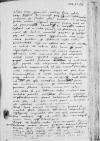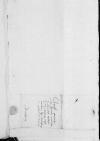 UUB, H. 154, f. 80r
UUB, H. 154, f. 80r
Heri inter cenandum redditae sunt nobis cf. Ioannes DANTISCUS to Ioannes CAMPENSIS (Jan van CAMPEN) & Helius EOBANUS Hessus (KOCH) before 1532-04-22, CIDTC IDL 6577, letter lost⌊litteraecf. Ioannes DANTISCUS to Ioannes CAMPENSIS (Jan van CAMPEN) & Helius EOBANUS Hessus (KOCH) before 1532-04-22, CIDTC IDL 6577, letter lost⌋, Praesul humanissime, quae quamvis nos exhilararent maxime, quod scribas isthic evenisse Tibi ex animi sen<ten>tia omnia, non parum tamen puduit Tuas ad nos pervenisse litteras prius, quam Tu accepisses nostras. Cessatum est a nobis primis, ut fateamur, quod verum est, diebus nonnihil, partim quod typographus ad rem nostram aggrediendam erat imparatior, partim quod Helius Eobanus Hessus (Eobanus Koch, Helius Coccius) (*1488 – †1540), neo Latin poet, humanist and writer, since 1509 secretary of bishop of Pomesania Hiob Dobeneck, lecturer of law at the University of Erfurt, 1526-1533 lecturer in the Nuremberg Gymnasium, 1530 visited Augsburg during the Imperial Diet, since 1536 professor of history at the University of Marburg; in 1512 attended the wedding of Sigismund I Jagiellon and Barbara Zápolya at Cracow (NDB, Bd. 4, s. 543-545; CE, vol. 1, p. 434-436)⌊EobanusHelius Eobanus Hessus (Eobanus Koch, Helius Coccius) (*1488 – †1540), neo Latin poet, humanist and writer, since 1509 secretary of bishop of Pomesania Hiob Dobeneck, lecturer of law at the University of Erfurt, 1526-1533 lecturer in the Nuremberg Gymnasium, 1530 visited Augsburg during the Imperial Diet, since 1536 professor of history at the University of Marburg; in 1512 attended the wedding of Sigismund I Jagiellon and Barbara Zápolya at Cracow (NDB, Bd. 4, s. 543-545; CE, vol. 1, p. 434-436)⌋ noster nullum humanitatis erga me officium Tua causa omittere volens, non urbem solum hanc, quam elegantissimo carmine nunc recens depinxit, ostedere mihi contentus fuit, sed aliquoties civitate mecum egressus vicinos pagos et hortos oculis subiecit, quare ex ambulatione fessi poculis nos aliquanto liberalioribus saepiuscule recreavimus. Ob hos mores, si succensere mihi volueris, obiiciam te ipsum Tibi, qui huic humanissimo et modis omnibus elegantissimo poetae abiens hinc me commendaris in the other hand, written over asse⌈asserisris in the other hand, written over asse⌉. Nosti poetarum mores, cum sis ipse meritissimus, lauro insignitus in the other hand, superinscribed in place of crossed-out laureatus⌈laureatusinsignitusinsignitus in the other hand, superinscribed in place of crossed-out laureatus⌉ poeta, scis musarum ingenia, quae haurientibus locis gaudere soleant, quare mirum Tibi videri non debet, si cum Helius Eobanus Hessus (Eobanus Koch, Helius Coccius) (*1488 – †1540), neo Latin poet, humanist and writer, since 1509 secretary of bishop of Pomesania Hiob Dobeneck, lecturer of law at the University of Erfurt, 1526-1533 lecturer in the Nuremberg Gymnasium, 1530 visited Augsburg during the Imperial Diet, since 1536 professor of history at the University of Marburg; in 1512 attended the wedding of Sigismund I Jagiellon and Barbara Zápolya at Cracow (NDB, Bd. 4, s. 543-545; CE, vol. 1, p. 434-436)⌊EobanoHelius Eobanus Hessus (Eobanus Koch, Helius Coccius) (*1488 – †1540), neo Latin poet, humanist and writer, since 1509 secretary of bishop of Pomesania Hiob Dobeneck, lecturer of law at the University of Erfurt, 1526-1533 lecturer in the Nuremberg Gymnasium, 1530 visited Augsburg during the Imperial Diet, since 1536 professor of history at the University of Marburg; in 1512 attended the wedding of Sigismund I Jagiellon and Barbara Zápolya at Cracow (NDB, Bd. 4, s. 543-545; CE, vol. 1, p. 434-436)⌋ nostro, Muses Greek goddesses of literature and the arts⌊MusarumMuses Greek goddesses of literature and the arts⌋ tanto antistite, poculis addictior written over xior⌈xiorctiorctior written over xior⌉ fuerim, maxime cum quid scriberemus, parum haberemus. Placaberis, certe scio, ubi pro unis, parum in tempore Tibi exhibitis, quaternas acceperis. Misi heri codices duodecim, in quibus si mendas forte fortuna offenderis aliquas, non negligentiae imputabis, sed rei ipsi, nemo enim tam fuit oculatus umquam, ut nihil illum inter recognoscendum libros usquam subterfugerit. Accepi ab hospite nostro, Bove Campestri, florenos quattuor, antea dederat autem decem Johannes Petreius (Hans Peterlein) (*1496 or 1497 – †1550), printer in Basel and Nuremberg, first editor of Nicolaus Copernicus' "De revolutionibus" (1543) (NDB, Bd. 20, p. 262-263)⌊PetreioJohannes Petreius (Hans Peterlein) (*1496 or 1497 – †1550), printer in Basel and Nuremberg, first editor of Nicolaus Copernicus' "De revolutionibus" (1543) (NDB, Bd. 20, p. 262-263)⌋; daturus fuerat libenter, quantum postea re ipsa ego comperi, quotquot mihi in Tuis negotiis usui esse potuissent. Vale, Praesul ornatissime, et nostras ineptias consule boni.


 UUB, H. 154, f. 80v
UUB, H. 154, f. 80v